Holiday 2025: Why the Winners Were Decided Months Ago

Which brands will win this holiday season?
New Traackr data reveals a growing truth in beauty: holiday success is not won in Q4. It is programmed all year long.
The brands positioned to dominate this holiday season are the same ones that have led every quarter this year. Their advantage comes from something every brand can build: a long-term influencer marketing strategy grounded in consistency, creator loyalty, and platform agility.
The question now is not who will win this holiday season. It is why, and what every brand should do differently heading into 2026.
The data is clear: Holiday leaders build momentum early
Last year’s data showed something unmistakable. The brands that invested early, not the ones who spent late, owned the holidays. In 2024, the same top brands (L’Oréal Paris, r.e.m. beauty, Rhode, Rare Beauty, and Kylie Cosmetics) that led from January through September also led the holiday season.
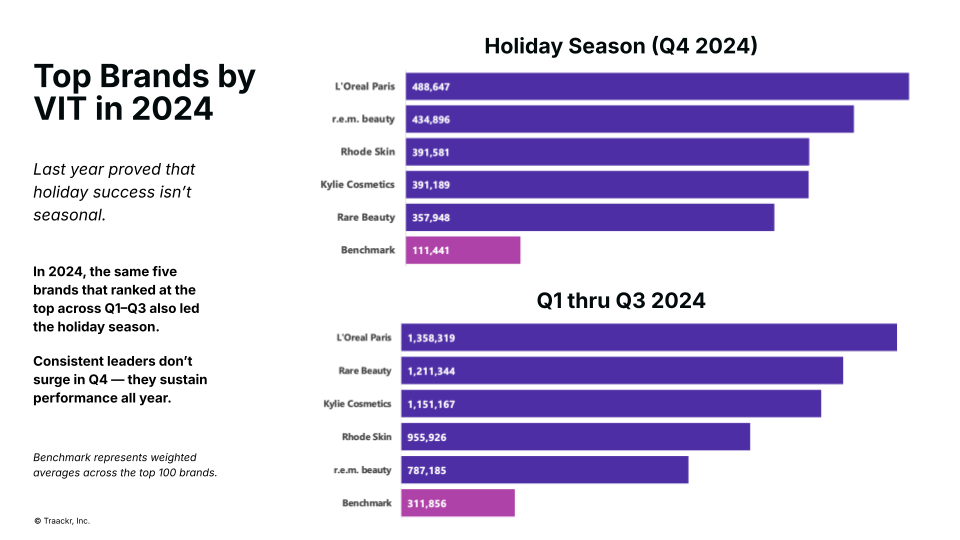
Their momentum came from the same four fundamentals that separate durable creator programs from fleeting campaigns.
A large creator community (creator volume)
L’Oréal Paris and Rare Beauty led in creator volume, sustaining year-round partnerships that drove steady visibility. Their consistent investment built communities that post naturally and frequently, rather than in one-off bursts.
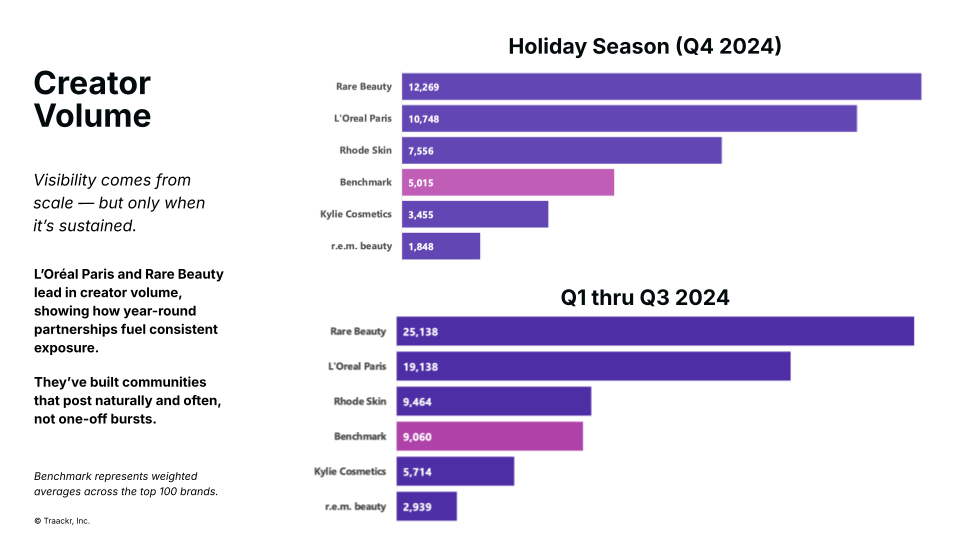
An engaged creator community (frequency of mentions)
Rare Beauty and Rhode showed high posting frequency, a sign of strong creator relationships and ongoing momentum. Regular creator activity kept products top of mind well before peak season.

Strong reach through creator content (average audience size)
r.e.m. beauty and Kylie Cosmetics led in audience size thanks to their founders’ large followings. This visibility was celebrity-driven, which helped accelerate reach — but it’s also a reminder that fame supports a strategy, not replaces one.
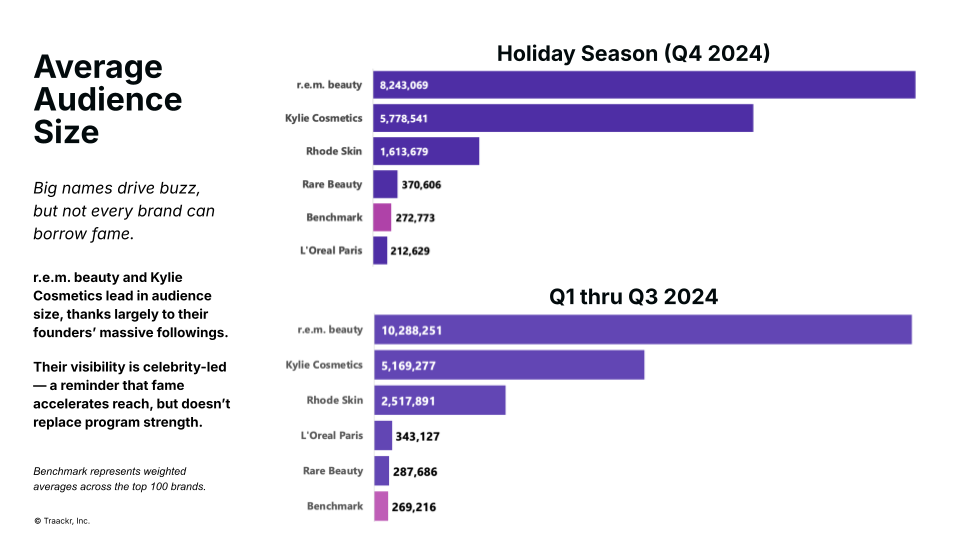
High performing creator content (content performance)
L’Oréal Paris outperformed peers in engagement by continually testing, refining, and selectively boosting content. Their edge came from iteration and insight, posting not just more—but smarter.
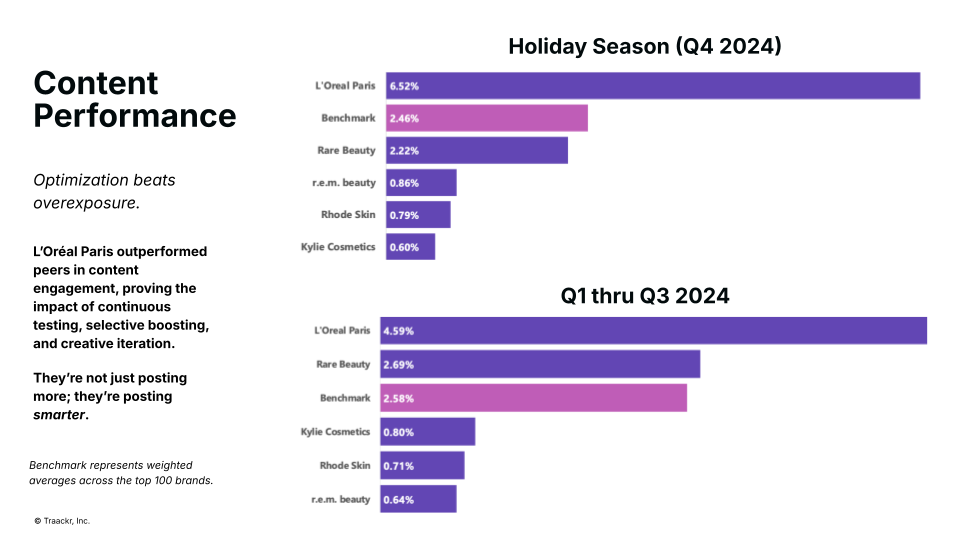
In 2025, the pattern is repeating
The same pattern is unfolding in 2025. Through Q1 to Q3, the top brands in Traackr’s VIT rankings include L’Oréal Paris, Rare Beauty, Kylie Cosmetics, Rhode, and Huda Beauty. These brands are already building visibility months before holiday shopping begins.
“You don’t spike your way into Q4 visibility — you compound your way into it,” says Pierre-Loïc Assayag, CEO & Co-founder of Traackr. “The brands winning the holidays are the ones that showed up consistently in every other month of the year.”
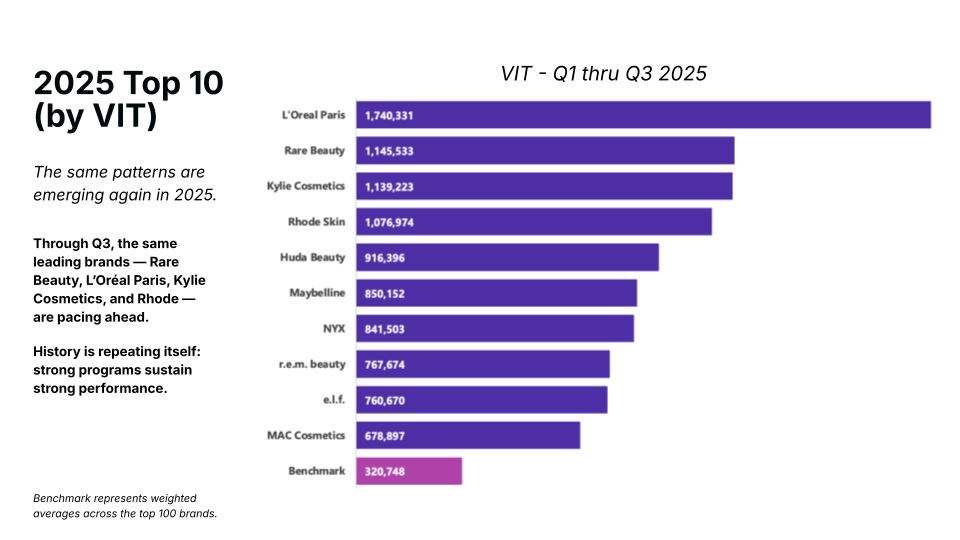
Although each brand follows its own path, the success signals are consistent.
- Creator volume: L’Oréal Paris and Rare Beauty sustain large and active communities.
- Frequency: Rhode and Huda Beauty keep creators engaged and frequently posting.
- Content performance: L’Oréal Paris and Huda Beauty lead via ongoing content optimization.
- Average audience size: Kylie Cosmetics and r.e.m. beauty amplify awareness through founder driven reach
Holiday success is predictable and also programmatic. The brands that built momentum all year are not scrambling for holiday visibility. They already have it.
How to win in creator marketing in 2026
Traackr’s 2025 Indie Beauty Brand Report points to the playbook.
Two of this year’s holiday leaders — Rare Beauty and Rhode — also exemplify the indie brands mastering the habits that compound influence all year long. Alongside peers like Saie, Kosas, Glow Recipe, and e.l.f., they build community through creator loyalty, spend with precision, move early on emerging platforms like YouTube, and embed authentically in culture.
Their results show the power of this approach: three times higher engagement efficiency, stronger creator retention, and a growing share of YouTube attention.
So what does this mean for your 2026 influencer marketing strategy?
1. Build trust early: Consistency across the year outperforms seasonal surges, and it starts by leaning into the creators who have mentioned your brand consistently all year long.
2. Prioritize creator loyalty over one-off campaigns: Retained creators are responsible for most attention among high-performing brands. Top performers earned up to 80 percent of attention (VIT) from returning creators, proving that loyalty is a measurable ROI engine.
3. Move where attention is growing: This year’s data shows attention shifting toward YouTube and smaller, high-authority creator segments. The bigger theme is agility. Brands that adapt quickly to emerging formats and verticals will gain an early mover advantage.
4. Design for cultural relevance instead of chasing trends: The brands leading growth don’t wait for culture. They design for it. Glow Recipe’s night market, Laneige’s Donut Shop, Rhode x 818, and e.l.f.’s Halo Glow remix show how creators naturally extend stories when moments feel native. In 2026, cultural fit will matter more than volume.
5. Optimize relentlessly: Boosting works best when it amplifies content that already resonates. Indie brands boost a smaller share of content yet earn triple the shares and saves of portfolio brands. Precision leads to stronger performance, and high performers adjust weekly rather than quarterly.
6. Treat Q4 as the output, not the goal: Holiday performance is the result of eleven months of consistent creator engagement, disciplined optimization, and cultural participation. With brands facing more pressure to do more with less in 2026, efficiency will be a critical growth lever.
“Holiday strategy is just your annual creator strategy under a microscope. If your program lacks strength in March, that weakness will likely be visible in December.” - Pierre-Loïc Assayag, CEO & Co-founder of Traackr.
The blueprint for 2026 is straightforward: build early, stay consistent, follow attention, and invest in creators as your most strategic channel. Brands that operate this way will not be scrambling for visibility next holiday season.
They will already be leading the race.
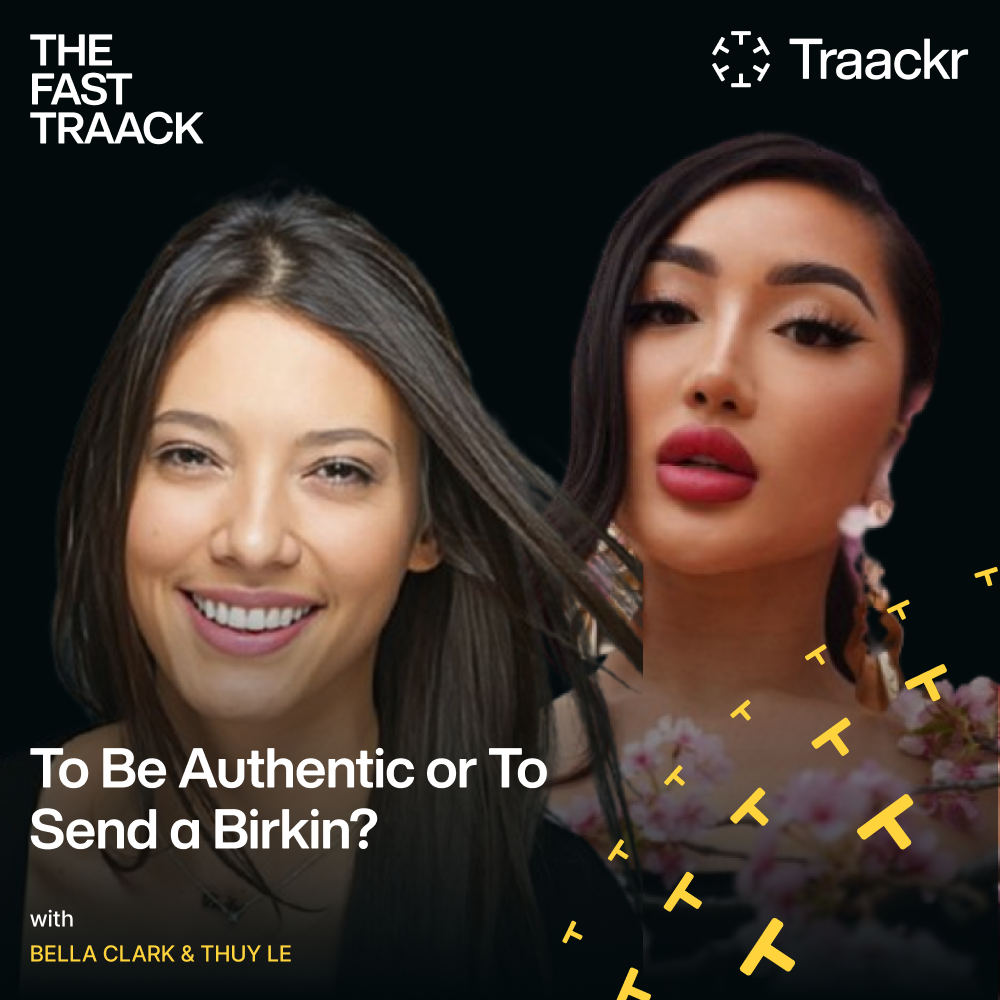
Listen to Bella Clark, Head of Influencer and Partnerships at Lipton, and content creator, Thuy Le, share why authenticity outshines extravagance when it comes to creator partnerships.
Listen nowSee which brands are leading the way in influencer marketing with our real-time performance leaderboard.
View brand leaderboard
Top Black Owned and Founded Beauty Brands in Influencer Marketing
.jpg)
How Top Brands Scale Creator Advocacy Beyond One-Off Campaigns
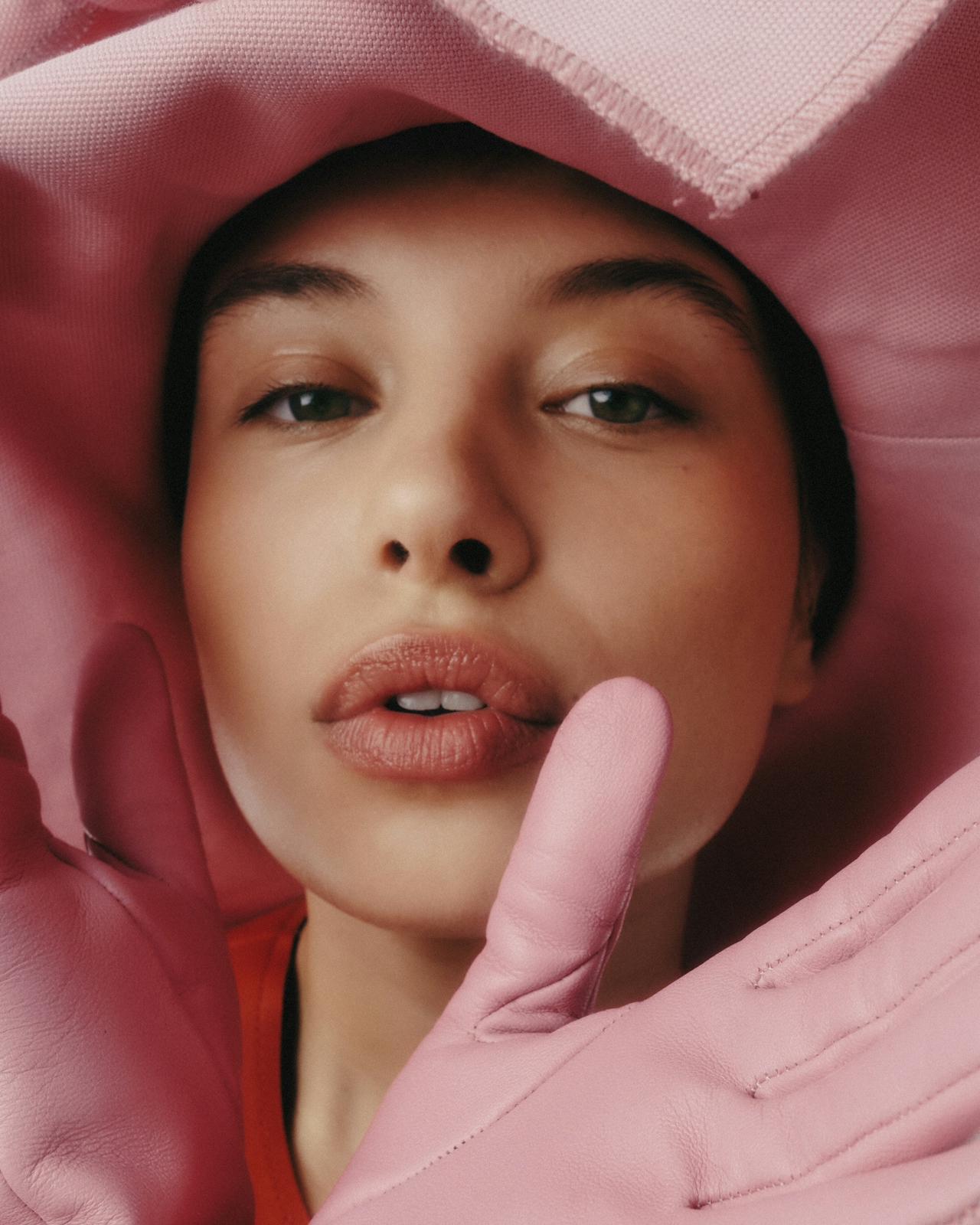
What Top & Rising Brands Are Teaching Us About Influencer Marketing in 2026
Level up your creator marketing expertise
Get industry insights and updates straight to your inbox.
.png)